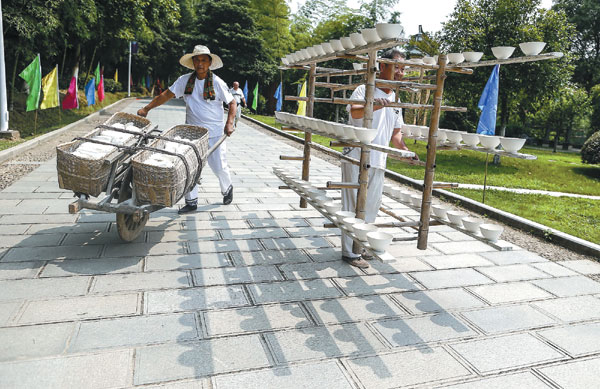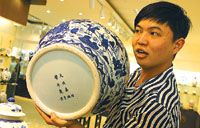|
 |
| Museum workers deliver porcelain. Photos by Zhang Hao / for China Daily |
The 'capital of porcelain'
|
 |
After more than 50 years working with traditional kilns, Hu is regarded as "the last master of the wood-burning kiln". He is aware that when he dies, many of the ancient techniques will die with him.
Jingdezhen has been dominated by the ceramics industry for more than 1,000 years, gaining the nickname "The Capital of Porcelain" after an 11th century emperor used the term in admiration of its beautiful products.
In the centuries that followed, Chinese vases, bowls and tableware became so famous worldwide that "china" became the English word for the material, supplanting the Franco-Italian term "porcelain".
In 1698, Jesuit missionary Pre Francois Xavier d'Entrecolles arrived in China. The Frenchman spent most of the next three decades in Jingdezhen, and in his letters to Europe he described the city as home to 3,000 kilns.
"But now, China's position as the global leader of the ceramics industry is threatened by oversea products. Even inside China, Jingdezhen is ceding its lead to cities in Guangdong," said Zhou Ronglin, director of Jingdezhen's Culture Protection Center, and a former head of the local museum of ceramic history. "Our only advantage we still have is our rich porcelain tradition and the ancient manufacturing process. That's why, while we develop the modern ceramic industry, we need to preserve the old techniques."
In addition to the Zhenyao, Jingdezhen has also restored three other ancient kilns, including the Huluyao, or calabash kiln, a name derived from its resemblance to the gourd. A blue-and-white jar fired in the kiln during the Yuan Dynasty (1271-1368) sold for $34 million at a 2005 auction in London.
Zhou said six other kilns in Jingdezhen are under repair and will be put back into use when the work is finished.
"The products made in Jingdezhen's ancient kilns have amazed people all over the world," Zhou said. "By protecting the kilns we are protecting the city's ceramic tradition, techniques and history."
